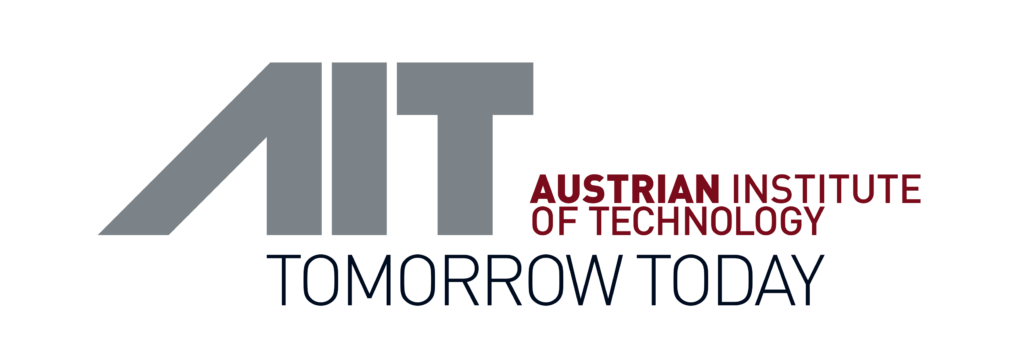
The AIT Austrian Institute of Technology (consortium leader) is Austria’s largest research and technology organisation. Among the European research institutes, AIT is a specialist in the key infrastructure issues of the future.
The AIT has about 1.400 employees – mostly based at the main facilities Vienna Giefinggasse, Seibersdorf, Wiener Neustadt, Ranshofen and Graz – working on the development of the tools, technologies and solutions for Austrian industries that are of utmost relevance for the future. All these efforts comply with our motto “Tomorrow Today”.
The AIT Austrian Institute of Technology takes a leading position in the Austrian innovation system and a key role in Europe as the RTO focusing on the key infrastructure topics of the future.
AIT provides research and technological development to realize basic innovations for the next generation of infrastructure related technologies in the fields of Energy, Low-Emission Transport, Health & Bioresources, Digital Safety & Security, Vision, Automation & Control and Technology Experience. These technological research areas are supplemented by the competence in the area of Innovation Systems & Policy.
As a national and international network node at the interface of science and industry AIT enables innovation through its scientific-technological expertise, market experience, tight customer relationships and high quality research infrastructure.

AVL List GmbH (“AVL”) is the world’s largest independent company for development, simulation and testing in the automotive industry, and in other sectors. Drawing on its pioneering spirit, the company provides concepts, solutions and methodologies to shape future mobility trends.
As a major contributor to e-mobility, AVL drives innovative and affordable systems to effectively reduce CO2 by applying a multi-energy carrier strategy for all applications – from hybrid to battery electric and fuel cell technologies.
AVL constantly evolves its ecosystem of high-end methodologies and innovative technologies in the area of vehicle development and testing which provides real world solutions to support customers’ future mobility ambitions. From the ideation phase to serial production, the company covers future vehicle architectures and platform solutions including the impact of new propulsion systems and energy carriers.
By digitizing the vehicle development with state-of-the-art and highly scalable IT, software and technology platforms, AVL creates new customer solutions in the areas of Big Data, Artificial Intelligence, simulation and embedded systems. In the field of ADAS and autonomous driving, AVL has built comprehensive competences to accelerate the vision of smart and connected mobility.
AVL’s passion is innovation. Together with an international network of experts that extends over 26 countries and with 45 Tech- and Engineering Centers worldwide, AVL drives sustainable mobility trends for a greener future. In 2020, the company generated a turnover of 1.7 billion Euros, of which 12% are invested in R&D activities.

The Institute of Computing Technology of the Chinese Academy of Sciences (hereafter ICT) was founded in 1956. It is the first academic establishment to specialize in comprehensive research on computer science and technology in China. The ICT has successfully built China’s first general-purpose digital computer and now has turned itself into an R&D base for high-performance computer technology. It is also the place where China’s first general-purpose CPU chip was born.
The ICT is the cradle for China’s computer undertaking. With its advent and growth, the ICT has nurtured hundreds of earliest computer professionals in China, more than 20 academicians are working or used to work or to study here. With the development of science and technology, the ICT successively spun off many academic institutions, such as the Institute of Microelectronics, the Computing Center, the Institute of Software, the Network Information Center, etc. all affiliated to the Chinese Academy of Sciences, as well as high-tech companies, such as Lenovo and Dawning. Over the past 50 odd years, the ICT has scored a remarkable success in scientific research and in creating scientific and technological achievements. The ICT, as the first organization to accomplish the undertakings, had obtained 714 scientific and technological achievements in total and won altogether 194 awards by the end of 2010. Of these awards, 38 are national-level awards and 156 are ministry-level awards.
Adhering to the principles of “fundamental, strategic, and advanced research”, taking the goal of “ascending the international forward position, being concerned about the nation’s economy and the people’s livelihood, and leading China’s information industry” as its duty, and advocating the culture of “innovation, realistic approach, unity, and high efficiency”, the ICT is striving to be a world’s topnotch academic institution.